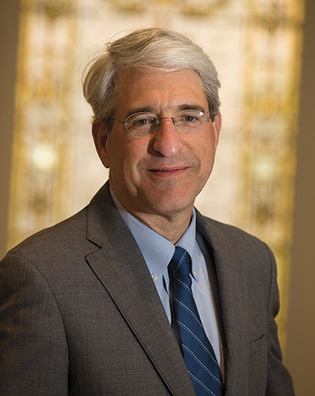 loading
loading
Q&A: Peter SaloveyThe entrepreneurial bentPresident Salovey talks about a new center for entrepreneurship and creative thinking. The Yale Alumni Magazine regularly holds a conversation with Yale president Peter Salovey ’86PhD to provide a forum in which alumni can learn his views. (Interviews are conducted both in person and by e-mail and condensed for print.)  Mark OstowIn this issue, Salovey discusses Tsai CITY, Yale’s new center for entrepreneurship and, more generally, creative thinking. View full imageY: In the fall, you inaugurated the Tsai Center for Innovative Thinking at Yale. What does Tsai CITY offer? S: Tsai CITY’s mission is to encourage and cultivate innovative thinking among all our students across disciplines, backgrounds, and sectors. Tsai CITY’s focus is on teaching students how to solve problems in society creatively. Some of these solutions will lead to the creation of new products or companies, but some solutions will be integrated into existing organizations like government agencies or school programs. Tsai CITY is a place for future entrepreneurs and for those who want to address global challenges in other ways. It has a broader mandate than helping students create new ventures, although it will certainly do so. I have no doubt many students will build on what they created through Tsai CITY to launch successful businesses after graduation. But Tsai CITY also provides students with the knowledge and experience to change public policy in their communities, thrive in careers that require creativity and interdisciplinary collaboration, and excel in public service. Our students will find themselves in leadership positions in many sectors throughout the world. Tsai CITY will teach them to approach problems in ways that complement Yale’s outstanding undergraduate, graduate, and professional educational programs. Y: How does Tsai CITY work with students? S: Tsai CITY interacts with students in diverse ways, ranging from informal, one-time events to programs that last for a semester or a summer. Some are developed by the staff and mentors, others are driven by students themselves. Here are a few examples. They have meetings called Intensives, which are deep dives with an expert leader into some topic of interest to students—such as design thinking, tactical urbanism, or hands-on biotech. Intensives allow students to explore cutting-edge ideas with guidance. They also have “pitch slams,” in which students learn how to express their ideas succinctly and persuasively, and then learn to find collaborators. A pitch is what an entrepreneur does in describing an idea to a venture capital fund manager; pitch slams help with that, but they do much more: they teach students to express their proposals in a compelling way. This skill will serve them well in any career and in serving the public good. They have an accelerator program to help students who have ideas for startups—in business, the nonprofit sector, the arts, or other areas. Staff at Tsai CITY will support students through the early, conceptual stage, providing them opportunities to obtain mentoring from experts, funding, and collaborators. There are also some special programs, such as one focused on entrepreneurship among women. For the Yale Women Innovators Series, people come to campus to talk about opportunities and challenges women face, including difficulties one may encounter in the culture of startups. Y: Do students receive academic credit? S: Essentially all the programs Tsai CITY supports are cocurricular. Students are not receiving credit, but “cocurricular” is the appropriate term because they are complementary to our curricular programs. Tsai CITY allows students to study topics in more depth and practice skills that they are learning in their classes, like critical thinking, quantitative analysis, and clear communication. There are credit-bearing courses on entrepreneurism already on campus. These are primarily within the School of Management’s entrepreneurship curriculum, which is open to the entire university. There are about 20 courses, drawing about 500 students every semester, for more-formal study of entrepreneurship, venture capital, and startups. Of course, faculty members are always a central part of entrepreneurship. The Office of Cooperative Research works with faculty members to patent, license, and commercialize discoveries and other intellectual property. Just this year, OCR has worked with a company called Biohaven Pharmaceuticals, a quantum computing startup called Quantum Circuits, Inc., and other faculty-led initiatives. OCR also holds a yearly Yale Innovation Summit, coming up this May at the School of Management. The summit showcases faculty innovation, and it is an inspiring event. It brings together Yale faculty members and investors. There are tracks in, for instance, both biotech and traditional tech. Last year, there were 600 people at the summit, and over 35 venture capital firms attended. It is my hope that some of Yale’s entrepreneurial work will stay in New Haven—helping economic development, job creation, and growth in our city. I recognize the appeal of Silicon Valley, or New York, or Boston. But I want to make sure we do everything we can to encourage our faculty and students to look toward New Haven as a place to put their skills in innovation to work in order to improve lives and communities.
The comment period has expired.
|
|